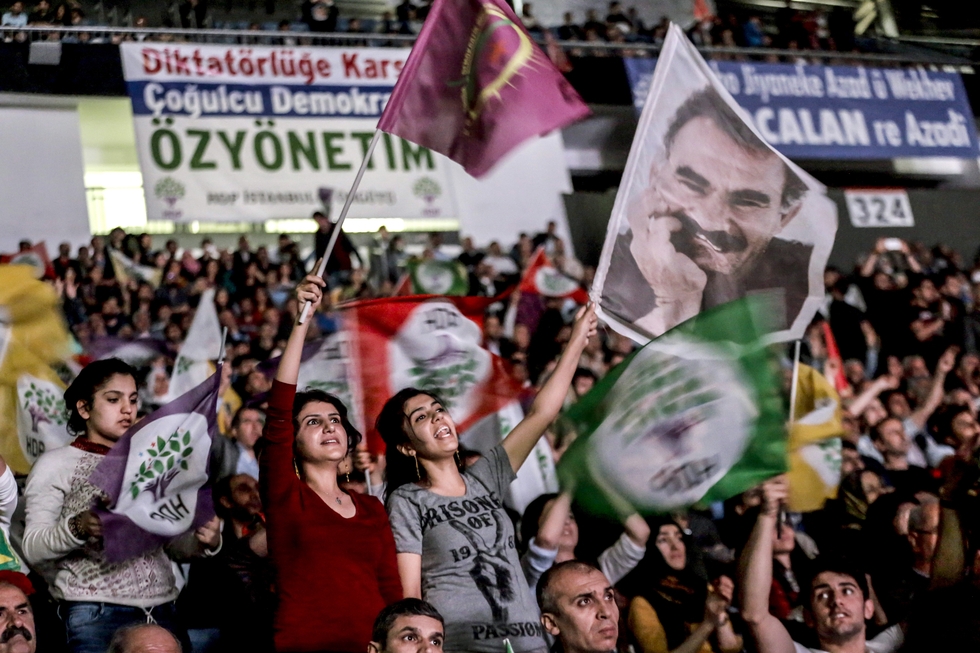Kurds call for probe into Ocalan conditions after coup attempt

The pro-Kurdish People’s Democracy Party are calling for an independent committee to look into the condition of imprisoned Kurdish separatist leader Abdullah Ocalan over fears that Friday’s coup plotters would have sought to target him.
Ocalan, 68, has been imprisoned on Imrali, an island off the Turkish coast in the Marmara sea, for 15 years after he was given life imprisonment for treason and separatism. Since April 2015, he has been kept in isolation.
The party, also known as the HDP, and the Imrali Committee, a group advocating for Ocalan’s release, warned on Wednesday that an “attack” on Ocalan by the “putschists” could “drag Turkey into an irreversible civil war".
“The security condition of Mr Ocalan is not an ignorable matter,” read the statement.
“Besides his legal rights of family and lawyer visits, an independent committee is required to meet Mr Ocalan in order to satisfy the public concern about his conditions as immediately as possible.”
Unconfirmed rumours have spread, cited by the newspaper Cumhuriyet, of a possible plan by the plotters to kidnap Ocalan on the night of the coup.
Activists have started a hashtag #WeDemand2SeeOcalan out of concern for his welfare.
Ocalan was captured in Kenya in 1999 in a CIA-aided operation after being expelled from his base in Syria following military threats against the country from Turkey.
Initially sentenced to death in a trial on Imrali, his sentence was commuted to life imprisonment after the death penalty was abolished in 2004 by Recep Tayyip Erdogan's Justice and Development party (AKP)-led government.
He was originally the only prisoner on Imrali before several others were added in 2009.
He spent many years communicating to his followers through lawyers and family members who visited until their access was cut in April 2015 - the last time Ocalan was heard from.
'Just like Morsi'
Selahattin Demirtas, co-chairman of the HDP, told Yeni Ozgur Politika, a Germany-based Turkish newspaper, said that Ocalan had, in fact, predicted the coup attempt as a product of the failure to resolve the Turkey-Kurdish conflict.
“He warned Erdogan many times,” said Demirtas. “He was saying, ‘Tell him, he doesn’t understand, he is acting like an idiot.’
The PKK-Turkey peace process was begun by Erdogan and Ocalan in 2012, coupled with a ceasefire in 2013, but faltered and eventually degenerated back into violence in July 2015.
“He continually warned him, saying, 'I am keeping him alive by maintaining the resolution process. Once the process is over, the coup mechanics will step in and then he will end up just like Morsi,'" said Demirtas, referring to the former Egyptian president overthrown in a military coup in July 2013.
The vast majority of HDP MPs are currently facing prosecution after parliament voted to lift the immunity of parliamentarians in June.
Although the HDP have distanced themselves from the PKK, particularly in light of the rise in violence in the southeast, many have been accused of maintaining links to the militant group.
HDP supporters often wave flags and hold banners with Ocalan's face at demonstrations and rallies, confirming to many a PKK link.
However, HDP supporters and other Kurdish activists have long argued that Ocalan is the head of the Kurdish Freedom Movement and that support for him should not be seen as implicit support for the PKK.
HDP officials have also complained about the lack of access to Ocalan and have raised concerns about his current health conditions.
HDP politician Nadir Yildirim said that at his last meeting with Ocalan, the Kurdish leader had said "putschists are just beside me, only a few yards away".
“There have been meetings between state-government officials and our friends, and they say Mr Ocalan is well, but the people who are telling us this burned alive 200 Kurdish youths in Cizre,” said Yildirim, according to the website Kurdish Question, referring to alleged attacks by Turkish security services in the southeast city.
“They razed our cities and towns to the ground, they oppressed and persecuted us in every way possible.”
'Reactionary mobs'
The HDP came out in opposition to Friday’s coup, despite also staunchly opposing the AKP-led government and Erdogan.
However, Demirtas warned that while Turkish society overwhelmingly rejected Friday's coup, the AKP was flooding the streets with "reactionary" supporters, some of whom had links to "jihadist" groups.
"We must not leave public space to the reactionary mobs," said Demirtas. "We must take the squares, saying 'neither the palace/Erdogan coup, nor the military coup,' 'there is no option but democracy', and take to the streets against all putschist mentalities."
He said that "Kurdish neighbourhoods, Alevi neighbourhoods, and leftists may become targets", adding that in this case "everyone has the right to legitimate self-defence against any attacks", but pointed out that PKK-linked Kurdish militant groups fighting the Turkish state in the southeast had not used the coup attempt as an opportunity to seize power.
"Kurdish guerillas could have taken advantage of this attempt and penetrated into several cities," he said. "But this would be playing into the hands of putschists. The Kurdish movement did not choose between two pro-coup mentalities, demonstrating an honorable stance, persistent in the peoples’ struggle for democracy."
Since the conflict between the PKK and Turkish state was officially launched by Ocalan and his allies in 1984, more than 40,000 people have died with human rights abuses reported on both sides.
The fighting in the southeast, which reignited in July 2015, has killed 1,761 people, according to new figures released by the International Crisis Group.
Middle East Eye propose une couverture et une analyse indépendantes et incomparables du Moyen-Orient, de l’Afrique du Nord et d’autres régions du monde. Pour en savoir plus sur la reprise de ce contenu et les frais qui s’appliquent, veuillez remplir ce formulaire [en anglais]. Pour en savoir plus sur MEE, cliquez ici [en anglais].




